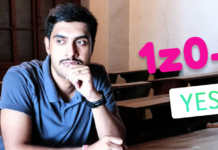First of all Thanks for all your wishes. Today I am going to answer all your questions on How to become ORACLE DBA.
After completing my internship from Center for Development of Telematics (C-DOT) Govt. of India, I enrolled for the Oracle DBA course. In addition to this, I have also done certification courses in Java programming and C programming. You can take a look at my Resume or connect with me on my LinkedIn.
Since the publishing of this blog post, Oracle has updated some of its courses. In
Oracle DBA course time duration
It was a 3 months course but it took around 7 months to complete because of the course content. Also, I wasn’t in a hurry since I wanted to understand the entire concept in depth in order to achieve good percentage in my exams.
Therefore, I opted for a classroom program which involved 4 hours of classes 5 days a week. Moreover for study material, I got Oracle e-books and course presentations.
Oracle DBA course program content
Oracle DBA certification involves 3 modules each followed by an exam.
- Oracle Database 10g: Introduction To SQL
- Oracle 10g Database Administration Workshop-1
- Oracle 10g Database Administration Workshop- 2
As a rule, after completing the 1st module you have to go through a 2-week training of Linux (RHEL). In which you will learn Linux fundamentals such as Linux installation for Oracle database, Setting-up Linux for Oracle installation. Also, network setup, basic shell scripting, Linux file-system, How to create files in Linux, CHMOD etc.
Oracle DBA exam syllabus
In each module, you have to cover different topics and concepts of Oracle 10g or 11g.
Oracle Database 10g: Introduction to SQL
This module concentrates on fundamentals as well as Advance SQL. Furthermore, you will learn a lot about SQL. Meanwhile, you can also check my SQL video tutorial for assistance.
This module has 20 chapters which are divided into 2 parts.
These are as follows:
Part 1
- Retrieving data using the SQL select statement
- Restricting and sorting data
- Using single row function to customize the output.
- Reporting aggregated data using the grout function.
- Displaying data from multiple tables –I
- Displaying data from multiple tables-II
- Using subqueries to solve problems
- Using set operators
- Manipulating data
- Using DDL statements to create and manage tables
- Creating other schema objects
- Managing objects with data dictionary
Part 2
- Controlling User access
- Managing schema objects
- Manipulating large data sets
- Generating a report by grouping related data
- Managing data in different time zones
- Retrieving data using subqueries
- Hierarchical retrieval
- Regular expression support
After completing Oracle Database 10g: Introduction to SQL as mentioned above, you’ll have 2 weeks of Linux (RHEL) training. When you are done with Oracle Database 10g: Introduction to SQL you can appear for the 1st exam. If you successfully complete this exam then you will qualify as Oracle Certified SQL expert.
This is the Second module of Oracle DBA certification and the second phase of How to become Oracle DBA.
In this module, you will learn several advance Oracle topics such as Installation, Managing Oracle instance, Memory management, SQL tuning. In addition you will also learn a little bit about backups and recovery, Oracle net services, Move data between databases and files.
This module has 18 chapters.
- Introduction (Database Architecture)
- Installing the Oracle Database Software
- Creating an Oracle Database
- Managing the Oracle Instance
- Managing Database Storage Structures
- Administering User Security
- Managing Schema Objects
- Managing Data and Concurrency
- Managing Undo Data
- Implementing Oracle Database Security
- Configuring the Oracle Network Environment
- Proactive Maintenance
- Performance Management
- Backup and Recovery Concepts
- Performing Database Backups
- Performing Database Recovery
- Performing Flashback
- Moving Data
After completing Oracle 10g Database Administration Workshop-1 you can appear for your second exam. And on successful completion of this exam, you will qualify as Oracle Certified Associate (OCA).
Oracle 10g Database Administration Workshop- 2
Last and the toughest Module in Oracle DBA certification is the third phase of how to become Oracle DBA.
This module mainly concentrates on Database recovery and backups.
This module has 17 chapters.
- Introduction
- Configuring RMAN
- Using RMAN
- Non-Critical Recovery
- Recovery
- Flashback
- Corruption
- Memory
- Performance
- Schema
- Storage
- ASM
- Resources
- Scheduler
- Security
- Globalization
- Workshop
As a rule after completing Oracle 10g Database Administration Workshop- 2 you can appear for your 3rd exam. And on successful completion, you will qualify as oracle certified professional.
Oracle has launched new versions like 12c and 18c since the publishing of this blog. You can check out Oracle DBA certification path for newer versions here. Also, if you are planning to become Oracle database developer then check the latest certification path here.
To be an Oracle certified DBA you have to give 3 exams
1. Oracle Database SQL Expert Exam Number:1Z0-047
You can take this exam after completing first module Oracle Database 10g: Introduction to SQL. This is an online multiple choice based exam concentrating on SQL/PLSQL knowledge.
This exam is valid for Oracle Database 10g, Oracle Database 11g, Oracle Database 11g Release 2, and Oracle Database 12c.
It is a 2 hour (160 mins.) exam and has 70 multiple choice questions. Furthermore, to pass this exam you have to secure a minimum of 66%means you have to correctly answer at least 47 questions.
This is an online exam thus you will get your result after 10 minutes of completing this exam. Moreover, if you successfully complete this exam you will get an Oracle Database SQL Certified Expert certificate both e-certificate and printed certificate which will get delivered at your registered address.
You can visit Oracle website for payment and other information
2. Oracle Database 10g: Administration- I Exam Number:1Z0-042
Click here to watch my video on Oracle Certified Associate (OCA) certification Kit opening
This exam is also known by the name of OCA or Oracle certified associate. This is because on successful completion of this exam you will be an Oracle Database 10g Administrator Certified Associate.
Oracle Database 10g: Administration-1 is a 2 hour (160 mins.) exam with 84 multiple choice questions. To pass this exam you have to secure a minimum of 68%. Meaning, you have to correctly answer at least 58 questions. This is valid against Oracle Database 10g R2.
You can visit Oracle website for payment and other information
3. Oracle Database 10g: Administration- II Exam Number: 1Z0-043
After successfully completing this exam you will be an Oracle Database 10g Administrator Certified Professional.
Like other two this is also a multiple choice online exam which has 70 questions with a duration of 90 minutes. Similarly, to clear this exam you have to secure at least 70% which means 49 correct answers.
The exam is valid against Oracle Database 10g and Oracle Database 10g R2. On successful completion of this exam, you will get an Oracle Database 10g Administrator Certified Professional in print as well as an e-certificate.
You can visit Oracle website for payment and other information
So, there you go! Hope these details help you in your endeavor to become an Oracle Certified DBA. I have tried to make the whole process easy to understand and follow. Meanwhile, if you have further questions then connect with me on my Facebook Page. Also, please Do Share This Blog. Good Luck Folks!












